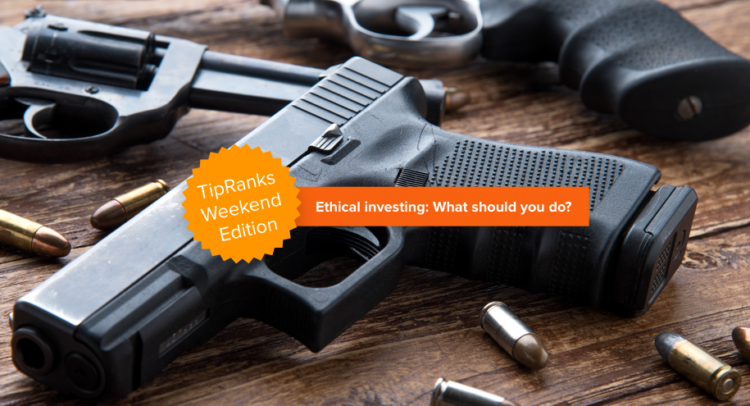Outside of the private-prison segment, few market sectors attract as much attention and controversy as self-defense stocks, particularly companies tethered to the firearms industry. With countless tragic gun-related crimes sparking across the nation over the years, tickers like SWBI, RGR, and POWW cannot avoid public anger. At the same time, gun and ammunition manufacturers do plenty of good, making for a complex but possibly bullish case.
Pick the best stocks and maximize your portfolio:
- Discover top-rated stocks from highly ranked analysts with Analyst Top Stocks!
- Easily identify outperforming stocks and invest smarter with Top Smart Score Stocks
Inherently, the issue of gun control consistently ranks near the top among the most politically significant discussions in the U.S. Quite frankly, gun violence is out of control in this country. In addition, too many of the victims are some of society’s youngest and most defenseless.
Moreover, one can never take the massive kill rate of firearms out of the equation. True, people can always commit murder through non-projectile weapons like knives and hammers. At the same time, such a comparison lacks moral equivalence. Simply put, it’s much easier to harm people at a greater scale with firearms. In addition, knives and hammers represent everyday necessities in an urban environment. The same can’t be said about guns and ammo.
However, firearm advocates also present a viable case for self-defense stocks. Fundamentally, gun ownership is integrated into the American DNA. Without firearms, the U.S. would not exist, likely remaining a British colony. As well, there are more guns than people in the U.S., implying strong sentiment for firearm ownership.
From a societal perspective, a rise in crimes in the post-pandemic new normal has negatively impacted both businesses and individuals. With varying response times for law enforcement agencies, sometimes, people must take matters into their own hands for self-preservation. Also, with public anger against law enforcement for police brutality incidents, fewer people want to become police officers.
Finally, the firearms industry also hires hundreds of thousands of Americans across the nation. Cracking down on the sector entirely would equate to careers destroyed, a matter that is also politically unpalatable. Therefore, contrarian investors may want to consider the below self-defense stocks.
Smith & Wesson Brands (NASDAQ:SWBI)
One of the most recognized and, therefore, controversial names among self-defense stocks, Smith & Wesson Brands benefits from a “bad-boy” image. Referenced in several pop-culture elements, Smith & Wesson arguably carries unparalleled notoriety on Wall Street. Just for that reason, investors may be overlooking its long-term potential.
Based on several financial metrics, SWBI stock appears to be significantly undervalued. For instance, Smith & Wesson enjoys a stable backdrop, featuring a cash-to-debt ratio of 2.75x. In comparison, the broader aerospace and defense industry features a cash-to-debt ratio of only 0.72x.
Moreover, the company features a three-year revenue growth rate of 27.6%. That’s far higher than the industry median of 1.7%. In addition, SWBI commands an average net margin of nearly 18%, whereas the median for the defense industry is only 3.7%.
On a year-to-date basis, SWBI is down nearly 43%. Although the company reported weaker gun demand, it’s always possible that election results favoring the Democrats could alarm conservative consumers into acquiring more firearms due to the threat of restrictive legislation.
What is the Price Target for SWBI Stock?
Turning to Wall Street, SWBI stock has a Moderate Buy consensus rating based on one Buy rating assigned in the past three months. SWBI’s price target is $22.00, implying 114% upside potential.

Sturm Ruger (NYSE:RGR)
A rival to Smith & Wesson and the only other publicly traded pure-play firearms manufacturer, Sturm Ruger might not have the same notoriety as its core competitor. However, industry experts and firearms enthusiasts recognize Sturm Ruger for its high quality and reliability.
Like other self-defense stocks, RGR features a significantly undervalued financial profile. On its balance sheet, Sturm Ruger features a cash-to-debt ratio of 96.5x, again well above the aerospace and defense industry median ratio of 0.72x. In addition, it features an equity-to-asset ratio of 0.87x, superior to the industry median of 0.46x.
Sturm Ruger’s three-year revenue growth rate currently stands at 13.8%, which is noticeably lower than Smith & Wesson’s metric. However, Sturm Ruger beats its rival in the net margin component at 19% over 18%. Notably, RGR features a price/earnings ratio of 10.3x, lower than the industry median’s 27.5 times.
Interestingly, however, RGR has no analysts coverage at the moment.
Ammo Inc. (NASDAQ:POWW)
As an ammunition manufacturer, Ammo Inc. presents a different angle among self-defense stocks. Specializing in quality ammo geared for hunting or personal defense, POWW has gained fundamental relevance because of the social undercurrents associated with the new normal.
To be fair, POWW is much riskier compared to the above self-defense stocks. As a newer entity, it needs to prove itself. Therefore, some investment resources label POWW as a possible value trap.
Nevertheless, there’s much to like here. On the balance sheet, Ammo features a cash-to-debt ratio of 1.9x, which is conspicuously higher than the industry median. In addition, the company features a debt-to-equity ratio of 0.03x, substantially below the defense industry median of 0.39x.
On the top line, Ammo currently runs a three-year revenue growth rate of over 149%, which may be somewhat deceptive given the company’s smaller stature. A more representative metric is its three-year free cash flow growth rate of 20.5%, which exceeds the industry median’s 4.9%.

What is the Price Target for POWW Stock?
Turning to Wall Street, POWW stock has a Moderate Buy consensus rating based on just one Buy rating. POWW’s price target is $9.00, implying 189.4% upside potential.

Conclusion: Branding May Have the Edge
To be clear, self-defense stocks represent significant risks, in part because of their controversial nature. However, if one had to pick a winner, it might be SWBI. Fundamentally, the branding of Smith & Wesson and the notoriety that it evokes may draw curiosity. In a tight consumer market, a business needs all the advantages it can get.



















